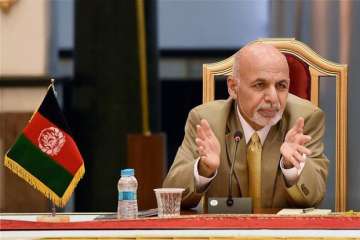Open Wagah border for trade with India or lose transit route to Central Asia, Afghan President warns Pakistan
Ashraf Ghani has warned Islamabad that Kabul would close down Pakistan's transit route to Central Asian countries if Afghan traders are not allowed to use Lahore's Wagah border for trade with India.
Afghanistan President Ashraf Ghani has warned Islamabad that Kabul would close down Pakistan's transit route to Central Asian countries if Afghan traders are not allowed to use Lahore's Wagah border for trade with India.
Speaking during a conference with the UK's special envoy for Afghanistan and Pakistan Owen Jenkins in Kabul, Ghani said on Friday, "If Pakistan does not allow Afghan traders to use the Wagah border for imports and exports of their goods, Afghanistan will also not allow Pakistan to use Afghan transit routes to reach Central Asia and other countries for exports."
"Afghanistan is no more a landlocked country as it has many transit routes for the import and export of goods," he said, adding that Pakistan has always shut its routes on Afghanistan's fresh fruit, causing loss of millions of dollars to the traders.
Ghani's statement in Pashto language was posted on Afghan president's official website.
He said, "Afghanistan wanted Pakistan and other regional countries to remove all technical problems that create obstacles in economic cooperation."
The Afghan president added that Kabul was making efforts to boost economic cooperation in the region and wanted Pakistan and other regional countries to remove all technical problems that create obstacles in economic cooperation.
Media reports quoted Afghan officials saying that Kabul has long been demanding the use of Pakistan’s land route to deliver goods at the Indian border town of Attari via Wagah.
However, Pakistan is reluctant to grant such permission in view of the state of its relations with India.
“It is offloaded in Wagah and then carried in carts up to Attari and loaded on again. This adds to transportation cost as well as to a significant spoilage,” Pakistan daily The Express Tribune quoted a source as saying.
“We have asked that our goods mostly fresh fruit be allowed to go up to Attari and then transferred to Indian trucks in a back to back arrangement. This alone can reduce cost and spoilage to an extent that will make our export of fruit to India double or triple,” he said.
In a veiled reference, Ghani also accused Pakistan of sponsoring terrorism, saying the recently organised and well-coordinated terrorist attacks showed that the terrorists receive aid from outside.
“Support to the terrorist groups is an action contrary to the good neighbourhood and all international norms and action of the neighbouring country is no more acceptable to the people and gov’t of Afghanistan,” he was quoted as saying.
Ghani’s statement comes ahead of his visit to India, an important strategic and economic partner of Kabul.
Ghani will arrive in Delhi on September 14 on a two day visit to hold "close consultations" on key issues with Prime Minister Narendra Modi during which India is likely to accede to Kabul's demand for increased military assistance.
Announcing the visit, External Affairs Ministry said the discussions between Ghani and Modi will cover a wide range of "matters of mutual interest".
"The upcoming visit will provide an opportunity to continue the close and frequent consultations between the two friendly neighbours, including at the highest level.
"Such interaction is the hallmark of their strategic partnership and has guided the strengthening of all-round cooperation between the two countries," the ministry said in a statement.
Afghanistan has been demanding increased defence supplies, including lethal weapons from India, which for the first time gave four Mi-25 attack helicopters to the war-torn country last year. According to sources, India may accede to demand and announce such assistance.
Apart from holding discussions with Modi, who will also host a lunch in his honour, Ghani during his working visit will also interact with business community and deliver an address at a prominent think tank in New Delhi.
